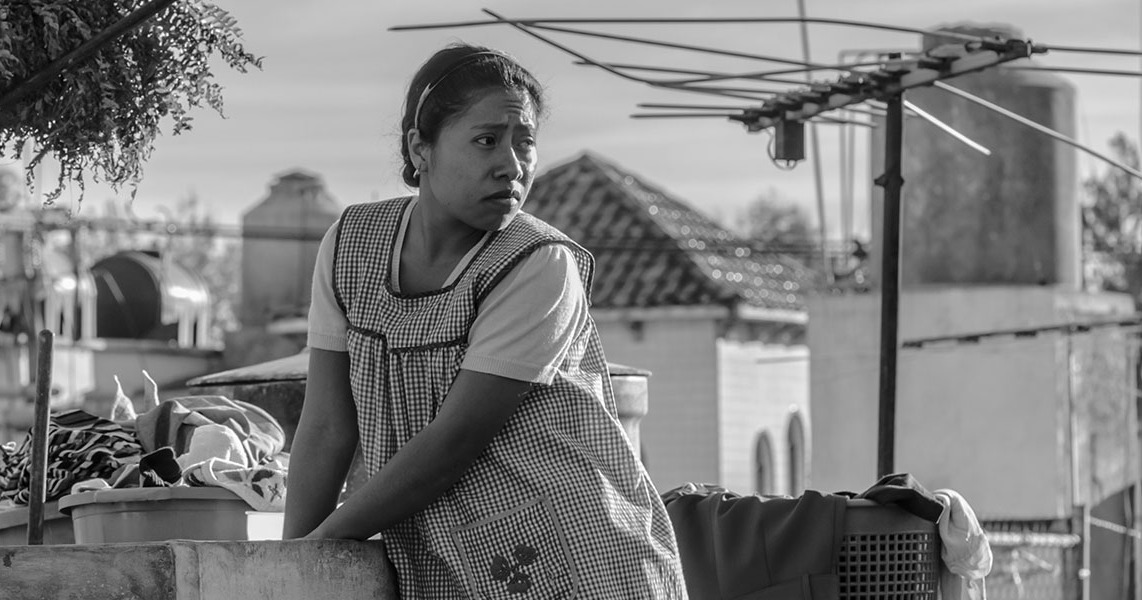

(Photo courtesy of Netflix)
By Peter Appleby
MEXICO CITY — In Alfonso Cuarón’s new film “Roma,” the housekeeper Cleo cleans, cooks and cares for family members who aren’t her own. She is always there, but she is also invisible.
“So many domestic workers could be Cleo,” said Marcelina Bautista in the offices of Mexico’s first union for domestic workers, Sindicato Nacional de Trabajadores y Trabajadoras del Hogar (SINACTRAHO). “Many of us have stories that Cleo lived through. I consider the film to be a reflection of what still happens in Mexico today.”
“Roma,” which Netflix released in the United States on Friday, has been hailed by many major publications as a masterpiece. The film has already won a slew of awards and received three Golden Globe nominations. Its cast members, including first-time actor Yalitza Aparicio in the leading role of Cleo, have become stars. Theater showings have sold out across Mexico, and “Roma” became the first film to be projected to the public at the Mexican president’s official residence, Los Pinos. Set in 1971, “Roma” follows the life of Cleo, an indigenous domestic worker of Mixtec origin who works for an upper-middle-class family in affluent La Roma, a neighborhood in Mexico City. It is a melancholic, beautifully rendered and heartfelt vision of the capital’s past.
https://www.youtube.com/watch?v=fp_i7cnOgbQ
For Mexico’s domestic workers, however, little has changed since 1971. Bautista, a former domestic worker who now fights for employee rights, saw the film three times before she realized the story was not set in modern-day Mexico. Her own life story, nearly 50 years later, looked so similar.
“Domestic workers are important in the lives of their employers, but they aren’t seen,” Bautista said. “They take care of the cleaning, the cooking and the kids. They’re important for that, but employers don’t see any further, that they have personal lives, that they need their rights.”
Indigenous and Female
There are some 2.4 million domestic workers active in Mexico today, with 95 percent of them female, according to the Instituto de Liderazgo Simone de Beauvoir. Many are indigenous. Collectively, they represent 10 percent of the entire female working population in the country. But about one-third of domestic workers receive less than the Mexican daily minimum wage, a meager 88.36 pesos, or roughly $4.38. The vast majority do not have access to basic workers’ rights and face discrimination, violence and even sexual assault.
Bautista left her native state of Oaxaca at 14 and moved to Mexico City for a job as a domestic worker. The work she found in the capital was not what she had hoped for.
“They often insulted me and said offensive things,” Bautista said. “When I left Oaxaca, I wanted to continue speaking Mixtec, but I realized I had to abandon it to survive the discrimination in Mexico City.”
While Bautista’s experience was upsetting, she soon understood that it was far from unique. She heard about cases of unjust firing, withheld payments, beatings and sexual assaults.
“There were many situations worse than mine,” she said.
Mexico’s First Domestic Workers Union
After working in homes for 22 years, mostly caring for children, Bautista finally decided to leave her job. She was tired of the abuse, she said. In 2000, she founded the Centro de Apoyo y Capacitación para Empleadas del Hogar (Center for Support and Training of Domestic Workers), or CACEH, to fight for the employment rights of domestic workers. After 16 years, she and her colleagues formed Mexico’s first union dedicated to domestic workers, SINACTRAHO. The bustling union now has more than 1,500 members nationwide and runs biweekly education and training programs that attract more than 70 workers.


(Courtesy of Netflix)
Sofía Pablo, 27, is a member of the union’s executive committee. For four years, she worked every weekend as a domestic worker to support herself while studying, spending six hours commuting each day, she said. She wasn’t paid for her travel nor was she paid well for her work.
“It’s one of the things I didn’t know. I was paid very little considering how much I did,” said Pablo, who now runs workshops on human rights, self-esteem and labor relations.
Pablo’s friendly relationship with her former employer meant that she rarely questioned her own situation.
“They tell us, ‘you’re part of the family,’” Pablo said. “In my case, my employers treated me well. We would share the same areas of the home but not in the same way.”
Formalizing Work
But friendly relationships between employer and employee can muddy the waters of obligation and expectation, especially when the job position is informal. SINACTRAHO is trying to formalize the position of domestic work. The vast majority of domestic workers do not have a written contract outlining pay, working hours or expectations. Instead, they rely on verbal agreements. The resulting employment situation fuels the archaic idea that domestic workers are separate from the rest of Mexico’s workforce.
“They don’t see us as proper workers,” said 44-year-old Norma Palacios, SINACTRAHO’s executive secretary. “They call us ‘the help.’”
Informality also means domestic workers have no legal recourse should a disagreement between employer and employee arise. Unfair dismissals are common, and employers are not legally obligated to pay the “aguinaldo,” a standard Christmas bonus given to employees in Mexico. Most importantly, employers have not been obligated to register domestic workers with the Instituto Mexicano del Seguro Social (Mexican Social Security Institute), which guarantees access to health care and, in some cases, pensions.


(Courtesy of Netflix)
‘A Long Way to Go’
But times are changing. On December 5, after a court battle involving an 80-year-old domestic worker who never received holiday or overtime pay during 50 years of service, Mexico’s Supreme Court ruled that “no constitutionally valid reason exists” for excluding domestic workers from mandatory social security benefits.
Bautista sees the ruling as a decisive moment in the fight for domestic workers’ rights.
“The court’s ruling is a beginning of solutions for all the problems that domestic workers have lived with for decades,” she said “There’s a long way to go.”
In the future, Palacios hopes to see the Mexican government ratify the International Labour Organization’s Domestic Workers Convention (Convention 189). The convention would give domestic workers legal entitlement to labor rights, including established working hours, standard minimum wage and protection against discrimination. Though Mexico signed the agreement in 2011, it has never been fully ratified.
The way that Cleo’s employers ignore her work and expect her to be at their beck and call is familiar to Palacios.
“The film is totally representative of the life of a domestic worker. Every domestic worker will think that it’s typical,” she said. “This is still the life of a domestic worker in Mexico today. You must be available 100 percent for the lives of your employers, and sometimes, the cost is your own.”
Bautista is hopeful that following the Supreme Court’s ruling and the impact of “Roma,” those employing the services of domestic workers, and perhaps society at large, will reflect.
“Everybody will see the film in a different way, but what we’re searching for is for a rethink and a change,” Bautista said. “The fight belongs to everyone. We need to learn that this work is valuable, that it costs and that those who do it have every right to access the rights that exist for workers.”
***
Peter Appleby is a British freelance journalist based in Mexico City. He has previously worked as an English-language editor at The News Mexico and Xinhua’s English-language Latin America desk.


